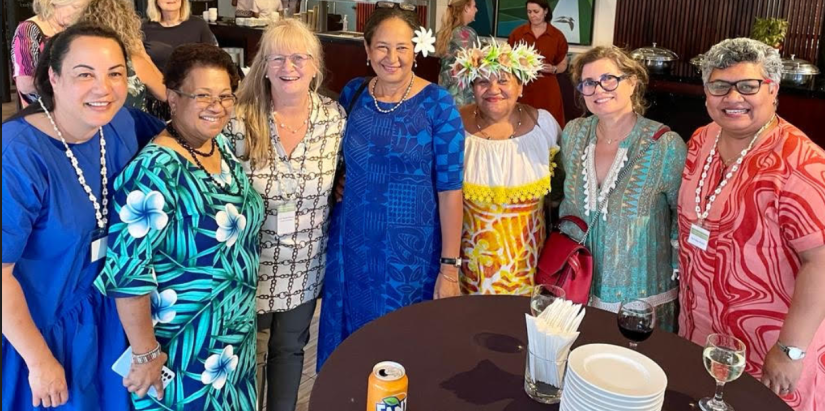The Regional Quality Improvement Program (RQIP) is a program of work led by the World Health Organization Collaborating Centre at the University of Technology Sydney (WHOCC UTS), in collaboration with the South Pacific Chief Nursing and Midwifery Officers Alliance (SPCNMOA) and the Australian Nursing and Midwifery Accreditation Council (ANMAC) and aims to further support the regional development of consistent regulation, accreditation of education programs and nursing and midwifery accreditation and practice standards in up to 14 named Pacific Island Countries (PIC).

Lorraine Herataka, Silina Waqa, Michele Rumsey, Elizabeth Iro, Nga Manea, Anne Pinel, Colleen Wilson
The program was first conceptualised at an SPCNMOA accreditation workshop in the Cook Islands in 2018 which focussed on regional accreditation issues in the Pacific region. In 2019 at a State of the Worlds Nursing meeting participants recommended to ‘progress regional partnerships and continued co-operation across undergraduate and postgraduate education, accreditation, CPD and standards development including involvement of South and North Pacific, Australia and New Zealand’. Also, in 2019, at the 13th Pacific Health Ministers meeting, the Pacific Health Ministers committed to ‘identifying the health workforce indicators needed for decision making for the issues of development, shortages, retention and regulation of the health workforce across primary health care and specialised services of the Pacific’. Further, the Western Pacific Region (WPR) of WHO has identified strengthening of regulatory systems for health workers a priority action domain to achieve Universal Health Coverage (UHC). In 2021 WHO funded a scoping report on the quality of nursing and midwifery education and regulation in the PIC. Then in 2022, the WHO CC UTS secured seed funding from ANMAC to fund the RQIP in collaboration with the SPCNMOA.
This year, a steering group of chief nurses, lead educators and regulators from member countries was set up to oversee this project. They met on the 20th July and 24th August 2023, to ratify the Terms of Reference for the Steering Committee and discuss the program plan, project definitions, procedures for data collection and nursing mobility in the region. A process of data collection has also been determined and discussed with the Steering Committee. The project team began initial meetings with the Chief Nursing and Midwifery Officers (CNMO) of 12 out of 14 countries in September to identify key stakeholders relevant to nursing program regulation, regulation of individual nurses and accreditation of nursing programs. Following these discussions, each CNMO will introduce the project team to key stakeholders, including members of nursing councils, accrediting and regulatory bodies, as well as higher education institutions delivering nursing programs. As of November, data collection has been completed in 3 out of 14 countries. Data collection will continue with an expected completion date at the end of 2023. It is anticipated a draft report will be compiled by February 2024.
Program Aims
The RQIP will assist PIC to strengthen their health systems and thus population health by improving nursing and midwifery education and practice. Specifically, the program aims to:
Agree on a regional approach to regulation, including accreditation, with links to country-based systems;
Develop both practice and accreditation standards that meet regional needs;
Develop consistent overarching curriculum guidelines for undergraduate and post-graduate courses, all of which are accredited, which integrate the practice standards;
Explore scope of practice for different levels of health workers;
Develop coherent and transparent pathways that enables healthcare workers to move between the various levels of work and education e.g. nurses aid, EN, community health worker, registered nurse, midwife, clinical nurse specialist, nurse practitioner etc.;
Review policies and guidelines on workforce mobility to considering the health needs of each country in the region and provide guidance if required.

